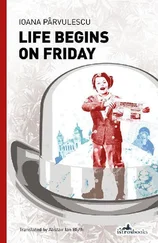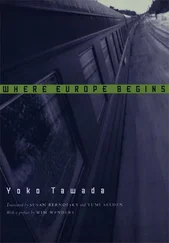What did I say, Clara says; she sounds interested now.
You said, No need to.
Stella has to laugh about it; Clara laughs too. Knowingly, probably wistfully; it’s so pointless.
So you do remember now, Stella says.
Yes, Clara says, I remember. And why are you telling me?
Because Mister Pfister is the exact opposite, Stella says; she straightens up and takes a deep breath. I’m probably telling you because he is the exact opposite. Well, in any case he comes by here every day. Every day. When Jason is here, he doesn’t; since Jason left, he’s coming again. Rings the bell, puts something in the letter box, doesn’t even wait any more; he knows that I’m here, that I won’t come out; he knows it very well.
Stella gets up, goes to the sunroom, opens the screen door and stands in the doorway. May sunshine on the lawn; the trees cast hard, precise shadows. The lilac is withered, the flower-clusters are brown. A biting wind blows around the corner of the house, and the clouds near the horizon move swiftly.
Mid-thirties? Maybe he’s in his mid-thirties. Stella thinks it would be better not to talk any more about Mister Pfister, it’s not doing her any good, but she can’t back off. She says, Actually he looks pretty good. Youthful, open, you know what I mean, but it’s as if … damaged, you know. He looks quite normal, just like the rest of us, but something else comes through from underneath, exhaustion, neglect. Misery. Are you listening?
Yes, Clara says, surprised. I’m listening to you.
Stella listens for sounds. Then she says, He’s absolutely alone. He acts as if he had all the time in the world. Endless amounts of time. By now I’ve seen him scores of times walking away from our house down the street, and he doesn’t look like a man going to work. He wears unremarkable clothes, a dark jacket, light-coloured jeans; he never has a briefcase, never a book or a newspaper or a mobile. But always a packet of tobacco, always cigarette papers, always a lighter.
She thinks about it. Then she says, with hostility in her voice, He smokes constantly.
She says, I’m certain his fingers are yellow from the nicotine. Index finger and middle finger; Stella can feel that she’s talking herself into a fury that might seem suspicious to Clara; nevertheless she keeps talking. He lives on our street. Five or six houses away. Jason walked by it. I haven’t. Maybe I ought to do that sometime? I think he considers himself somewhat superior; you can tell from his handwriting. In any case, his spelling is correct and he listens to classical music; he wrote that to me. I have the feeling he got stuck. He got stuck; one day or other in his life something just didn’t keep going; he’s caught in a time warp and thinks he can pull me into it with him — that’s what it looks like.
Stella says, Do you follow me, and she listens to Clara’s thoughtful silence on the other end of the line, Clara’s thoughtful silence in her oh-so-distant life. But today, just as back then, Clara still prefers to sit in the kitchen and, Stella knows, she has her feet up on the chair and the telephone clamped between her head and shoulder because she has to hold the cigarette in her left hand and the pencil in her right.
Clara, I’m asking you whether you can follow me. What are you drawing?
I can follow you. I’m drawing spirals, of course, Clara says drily. I’m drawing a time warp.
And how should I visualise that, Stella says.
Well, like a black hole, Clara says. A spiral, a very delicate one; I drew a delicate spiral, more of a vortex. In the middle, a black hole. Undertow or a deep void. The deep void in which Mister Pfister got stuck, that’s what I’m drawing, it’s obvious.
Please cut it out and send it to me, Stella says. Write something comforting under it, maybe something botanical. As if the spiral were something beautiful, a plant.
I will, Clara says. Already doing so.
*
Back then — in the apartment in the city, in the three rooms of which Clara had the left one, Stella the right one, and the middle room had only a sofa, the telephone and always a bunch of flowers — Clara had cut a poem out of the newspaper and hung it up on the apartment door. And the poem had stayed there until they moved out. The last line, as far as Stella can remember, was, Let everyone in, whoever may come.
*
Do you remember the title of the poem you hung up on our door?
House Rules. The title of the poem was House Rules.
Stella says, that’s right. House Rules. Now I remember. If you were here, it would still apply. I would have to let everybody in, and I would have let Mister Pfister come in too. Would have invited him into the kitchen and put a cold beer on the table for him.
But Clara isn’t here, and without Clara the commandments of these House Rules are defunct. Mister Pfister seems to know this; perhaps it’s precisely because of this that he began to take note of Stella, Stella without Clara’s protection and apparently without Jason’s protection as well.
Do you think I should let him in? Open the door for him and speak to him?
No, Clara says slowly, and her voice sounds so earnest and profound that Stella suddenly becomes quiet. No, you should not let him in. Shouldn’t open the door for him, or talk to him either. You should look out for yourself. Stella. Will you do that?
Now Mister Pfister comes by every day. He has figured out that Stella is trying hard not to be at home in the mornings, changing her shifts, starting them as early as possible, or being somewhere else; three times already she’s sat in a café in the pedestrian zone, trying vainly to read a book, drinking tea with milk, eating a plain croissant, and feeling like a stranger in her own life.
Mister Pfister has caught on. That’s Jason’s expression — Mister Pfister has caught on, and so he just comes by a little earlier or a little later; even though he knows that Stella won’t come to the door, it’s important that she’s there when he rings the bell. He knows when she is there; he knows almost always, and Stella can’t think where he’s actually observing her from. When Ava is there, he doesn’t ring, but she feels it’s only a matter of time, a matter of days before he’ll ring when Ava is at home too. What comes to Stella’s mind? A flood. The level rising. A deadline approaching, a time limit expiring.
Mister Pfister rings at the garden gate. He waits a precisely measured moment, drops something into the mailbox, goes on his way. He never turns around; he always passes the house and walks on. Stella no longer stands in the hall by the door. She stays wherever she is when he rings. Sometimes she’s sitting in her room at her desk and sees him coming; he comes along the street from the left, and she leans back, closes her eyes, counting his steps. She whispers: Four, three, two, one more — now, and then the bell rings; if the window is pushed up, she can hear the clatter of the mailbox. She keeps her eyes closed, counts his steps to the street corner, keeps counting, and when she opens her eyes, he’s already gone the length of Forest Lane and is out of sight.
Every day.
There’s a letter in the mailbox. A card, an envelope, a scrap of paper, or a letter, and Stella takes a shoebox with her to the mailbox and drops the letter, the card, the envelope, the piece of paper into the shoebox, unread; she pushes the cover down on the shoebox as if there were something inside it that might offer resistance, and puts the shoebox on the floor in the shed under the workbench.
Tuesday, Wednesday, Thursday, Friday.
Friday is a warm day. The early morning sky, a transparent blue. Stella argues with Ava about whether or not shoes are necessary for the trip to kindergarten. At least she gets her to wear a jacket. In the child seat Ava triumphantly sticks her bare feet up in the air.
Читать дальше












